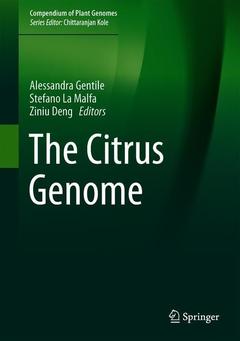Description
The Citrus Genome, 1st ed. 2020
Compendium of Plant Genomes Series
Coordinators: Gentile Alessandra, La Malfa Stefano, Deng Ziniu
Language: English
Subjects for The Citrus Genome:
Publication date: 03-2020
294 p. · 17.8x25.4 cm · Hardback
294 p. · 17.8x25.4 cm · Hardback
Description
/li>Contents
/li>Comment
/li>
This book reviews how the release of the citrus genome facilitates the investigation of ancestral species, the study of their complex biological features, and the genetic basis of agronomic traits of paramount importance for their sustainable cultivation.
The first chapters discuss citrus origin and distribution, and the economic importance and varietal composition of the cultivated species, providing an overview of citrus and related genera genetic resources. The book then describes the role of traditional breeding techniques (for scion and rootstocks) as well as the potential of genomic breeding and innovative protocols for biotechnological approaches. The second part provides essential information on the genus Citrus, the attributes of pure citrus species, genetic admixtures, hybrids and citrus relatives, and on the horticultural classification of cultivated species, varieties and rootstocks. The third part then focuses on the different molecular mechanisms, covering various aspects of citrus biology, including the role of beneficial compounds of citrus fruits. In addition, it examines the molecular responses of citrus to abiotic stresses and to field and post-harvest diseases.
Providing insights gained in recent years, it is a valuable guide for those who are interested in gene discovery, comparative genomics, molecular breeding and new breeding techniques. It is particularly useful for scientists, breeders and students at universities and public sector institutes involved in research for the citrus industry.
See attachment.
Presents essential information on why citrus species are among the most important fruit crops in subtropical and Mediterranean areas
Defines several goals of primary importance for the citrus industry, and which can benefit from the use of genomic tools
Offers readers novel insights regarding the application of genomic data in citrus genetics and breeding
© 2024 LAVOISIER S.A.S.
These books may interest you

The Genus Citrus 303.20 €



